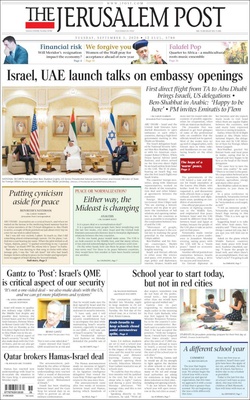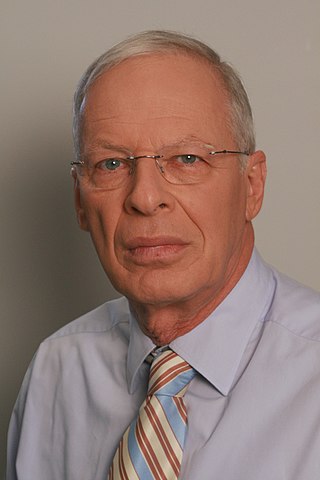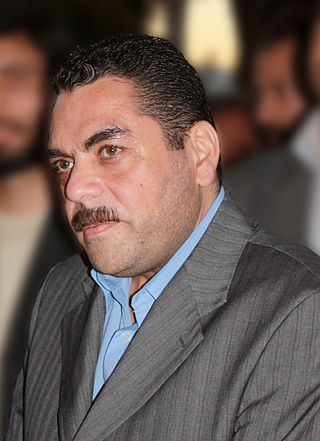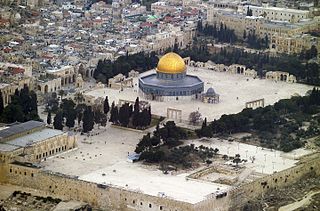This timeline of the Israeli–Palestinian conflict lists events from 1948 to the present. The Israeli–Palestinian conflict emerged from intercommunal conflict in Mandatory Palestine between Palestinian Jews and Arabs, often described as the background to the Israeli–Palestinian conflict. The conflict in its modern phase evolved since the declaration of the State of Israel on May 14, 1948 and consequent intervention of Arab armies on behalf of the Palestinian Arabs.

Haaretz is an Israeli newspaper. It was founded in 1918, making it the longest running newspaper currently in print in Israel. The paper is published in Hebrew and English in the Berliner format, and is also available online. In North America, it is published as a weekly newspaper, combining articles from the Friday edition with a roundup from the rest of the week. Haaretz is Israel's newspaper of record. It is known for its left-wing and liberal stances on domestic and foreign issues.

The Jerusalem Post is an English language Israeli broadsheet newspaper based in Jerusalem, founded in 1932 during the British Mandate of Palestine by Gershon Agron as The Palestine Post. In 1950, it changed its name to The Jerusalem Post. In 2004, the paper was bought by Mirkaei Tikshoret, a diversified Israeli media firm controlled by investor Eli Azur. The Jerusalem Post is published in English. Previously, it also had a French edition.
The Committee for Accuracy in Middle East Reporting in America (CAMERA) is an American non-profit pro-Israel media-monitoring, research and membership organization. According to its website, CAMERA is "devoted to promoting accurate and balanced coverage of Israel and the Middle East." The group says it was founded in 1982 "to respond to The Washington Post's coverage of Israel's Lebanon incursion", and to respond to what it considers the media's "general anti-Israel bias".
Amotz Asa-El is an Israeli author and journalist.

Ehud Yaari is an Israeli journalist, author, television personality and political commentator.

The Jerusalem Report is a fortnightly print and online news magazine that covers political, military, economic, religious and cultural issues in Israel, the Middle East, and the Jewish world.

Khaled Abu Toameh is an Israeli Arab journalist, lecturer and documentary filmmaker.

David Landau OBE was a British/Israeli journalist and newspaper editor. Landau was editor-in-chief of the Israeli newspaper Haaretz from 2004 to 2008. He was the founder and editor-in-chief of the paper's English edition from 1997 to 2004. Before joining Haaretz in 1997, Landau was the diplomatic correspondent of The Jerusalem Post for 12 years and its managing editor for four years. After leaving Haaretz Landau became the Israel correspondent for The Economist.

Israeli casualties of war, in addition to those of Israel's nine major wars, include 9,745 soldiers and security forces personnel killed in "miscellaneous engagements and terrorist attacks", which includes security forces members killed during military operations, by fighting crime, natural disasters, diseases, traffic or labor accidents and disabled veterans whose disabilities contributed to their deaths. Between 1948 and 1997, 20,093 Israeli soldiers were killed in combat, 75,000 Israelis were wounded, and nearly 100,000 Israelis were considered disabled army veterans. On the other hand, in 2010 Yom Hazikaron, Israel honored the memory of 22,684 Israeli soldiers and people of the Yishuv killed since 1860 in the line of duty for the independence, preservation and protection of the nation, and 3,971 civilian terror victims. The memorial roll, in addition to IDF members deceased, also include fallen members of the Shin Bet security service, the Mossad intelligence service, the Israel Police, the Border Police, the Israel Prisons Service, other Israeli security forces, the pre-state Jewish underground, and the Jewish Brigade and the Jewish Legion.

Samir Kuntar was a Lebanese Druze member of the Palestine Liberation Front. In 1979, he took part in the Nahariya attack in Israel, for which an Israeli court would convict him of murder and terrorism. Kantar denied the accusations and maintained his innocence. He was eventually released as part of the 2008 Israel–Hezbollah prisoner exchange.

Freddy Eytan is an Israeli diplomat, former ambassador, author and journalist.
Events in the year 2009 in Israel.
Zoological conspiracy theories involving Israel are occasionally found in the media or on the Internet, typically in Muslim-majority countries, alleging use of animals by Israel to attack civilians or to conduct espionage. These conspiracies are often reported as evidence of a Zionist or Israeli plot.
Events in the year 2011 in the Palestinian territories.

Avi Issacharoff is an Israeli journalist, known for his focus on Palestinian affairs. He is a Middle East commentator for The Times of Israel and its sister news outlet Walla!, and the Palestinian and Arab Affairs Correspondent for Haaretz. Issacharoff is known as one of the creators of the TV-series Fauda.

Jonathan Spyer is a British-Israeli analyst, writer, and journalist of Middle Eastern affairs. He is director of research at the Middle East Forum, editor of Middle East Quarterly magazine, a fellow at the Jerusalem Institute for Strategy and Security, a freelance security analyst and correspondent for Jane's Information Group, and a columnist for The Jerusalem Post.

On 15 April 2022, clashes erupted between Palestinians and Israeli Security Forces on the Al-Aqsa compound in the Old City of Jerusalem. According to the United Nations Special Coordinator for the Middle East Peace Process, the clashes began when Palestinians threw stones, firecrackers, and other heavy objects at Israeli police officers. The policemen used tear gas shells, stun grenades and police batons against the Palestinians. Some Palestinians afterwards barricaded themselves inside the Al-Aqsa Mosque and proceeded to throw stones at the officers. In response, police raided the mosque, arresting those who had barricaded themselves inside. In addition, some damage was done to the mosque's structure.











